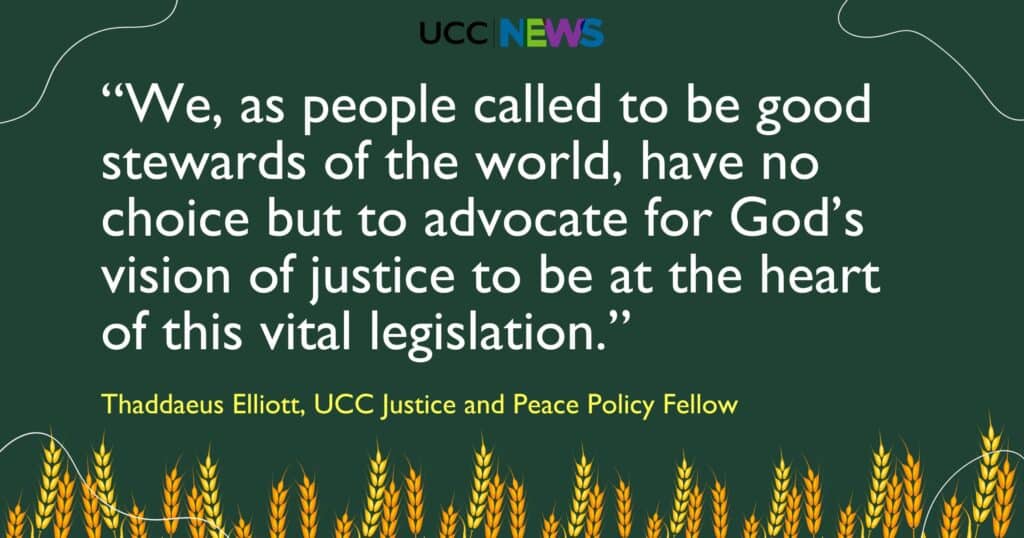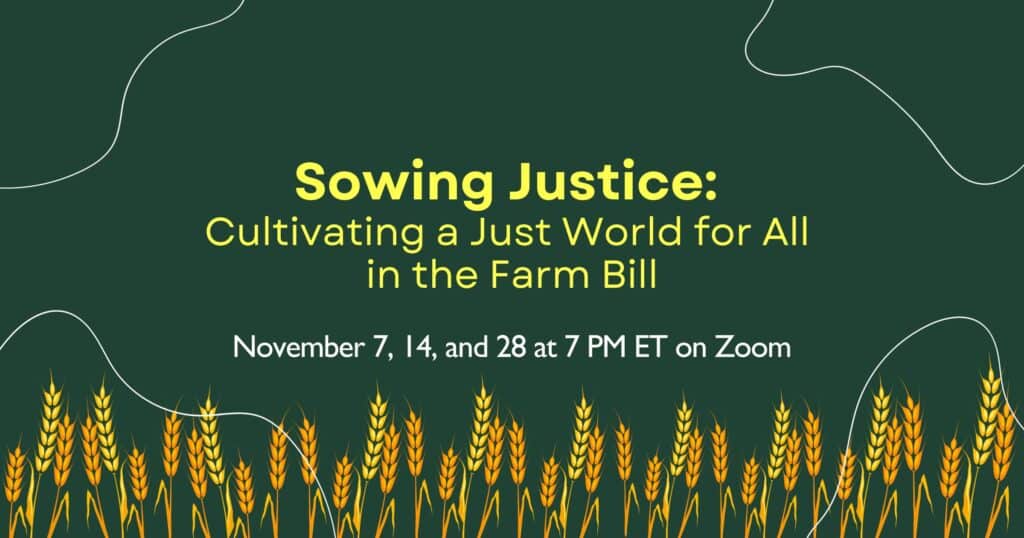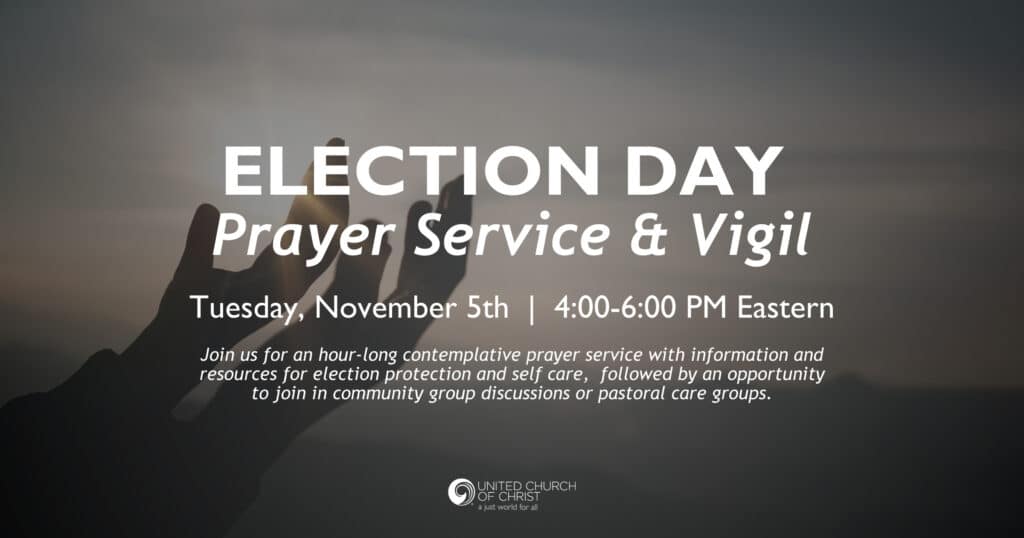Climate, economy, hunger: Learn how farm bill affects many lives — and what you can do about it
Every five years, the federal farm bill affects millions of people in the United States.
The omnibus legislation impacts a wide range of issues: climate change, agricultural economy and food security.
That’s why the United Church of Christ’s Office of Public Policy and Advocacy in Washington, D.C., is collaborating with the Franklinton Center at Bricks for a three-part webinar series about the farm bill, beginning Tuesday, Nov. 7 at 7 p.m.
“On the surface, the farm bill sounds like a niche piece of legislation,” said Thaddaeus Elliott, UCC policy fellow at the D.C. office, who will be leading the webinars. “But when you dig beneath the surface, one finds at the heart that it is about stewardship of creation. It’s about feeding the hungry, preserving and creating economic opportunity so that small farms can thrive. It’s also about protecting our natural resources and mitigating the effects of climate change so that we can continue to experience and share equitably in the bounty of the earth.”
Due to the complexity and enormous significance of the bill, the D.C. staff hope that detailed resources such as this webinar series will equip UCC members in putting their faith in action.
“We are excited to offer this webinar series to highlight the importance of the farm bill to our UCC advocates,” said the Rev. Michael Neuroth, director of the D.C. office. “As the UCC, we are interested in highlighting not only the broad impact it has on food policy and nutrition programs such as SNAP, but also how the bill addresses issues of sustainable agriculture and climate change, as well as systemic issues related to access and equity for BIPOC and other marginalized or small farmers.”
Three webinars, three themes
The goal of the webinars is to inform and inspire people of faith to advocate for a just farm bill that protects the viability of the planet, supports and rewards small farmers and ranchers as stewards of the land and sustainers of life, and allows all people to equally partake in the abundance and bounty of the fruits of their labor.
“These are all matters of justice that the UCC has long engaged in and advocated for,” Elliott said. “With food insecurity on the rise, small farms struggling to survive against the dominance of corporate agriculture and the climate crisis wreaking havoc on the ecosystems on which all life on this planet depends, we need a farm bill that takes these concerns seriously and advances effective solutions to address them. We, as people called to be good stewards of the world, have no choice but to advocate for God’s vision of justice to be at the heart of this vital legislation.”
Instead of trying to address all these justice issues in one webinar, the D.C. office decided to focus on three different themes in each installment. The webinars will occur on three Tuesdays — Nov. 7, 14 and 28 — at 7 p.m. ET on the following topics:
- Nov. 7: Conservation and sustainable agriculture
- Nov. 14: Support of small farmers with an emphasis on support of historically disadvantaged farmers of color
- Nov. 28: Increasing food access through nutrition programs and localized food systems
Each webinar will include a call to action and ways to advocate for justice in the farm bill.
Priorities directed by Synod
The denomination’s policy advocacy work is informed and directed by resolutions passed by General Synod. Since the founding of the denomination in 1957, the UCC has passed several resolutions regarding rural life, the environment, hunger and racial justice that inform national staff advocacy priorities for the farm bill.
Through the D.C. office, the UCC has also joined with fellow partners in the Washington Interfaith Staff Community in signing a “Faithful Farm Bill” letter that goes into finer detail on specific policy requests.

Broadly, those priorities are:
- Protecting, expanding and strengthening programs that reduce hunger, address food insecurity and improve nutrition in the United States and around the world;
- Strengthening policies and programs that address climate change through food waste reduction, cutting greenhouse gas emissions in agriculture and conservation and protection of natural resources from environmental degradation;
- Providing a fair and effective farm safety net that allows small farmers, farmworkers and producers to earn economically sustainable livelihoods;
- Ensuring equitable access and implementation of all USDA programs to historically disadvantaged communities to address past and present discrimination and disparate impact;
- Advocating for the passage of “marker bills,” such as the Agriculture Resilience Act, the Justice for Black Farmers Act and the RESTORE Act.
Partnership with Franklinton Center
Panelists for the first webinar on Nov. 7 will include Elliott; Elivette “Elly” Mendez Angulo Brown, program manager at Franklinton Center; and Joe Van Wye, policy and outreach director at Farm Action.
“We are excited to partner with Franklinton Center to present this webinar series not only to uplift their tremendous justice work, but to also present a different face and voice to humanize the impact of these policies and programs,” Elliott said.
As its website notes, the Franklinton Center — located in Whitakers, N.C. — was a ministry of the UCC, managed and staffed by Justice and Witness Ministries (now Justice and Local Church Ministries), until it became a stand-alone organization in 2015. The center continues to partner with the UCC and lists dozens of UCC congregations among its faith-based donors.
Such partnerships and opportunities like the webinar series are key for advancing justice in policy, as D.C. staff noted.
“Working toward a more just farm bill will not only support the farmers whose livelihoods depend on these policies, but by working toward greater equity and justice throughout the bill we will also improve our nation’s food systems, strengthen the economy, and protect our environment and therefore our future,” Neuroth said.
All information, webinar recordings, resources and calls to action will be available on the UCC’s farm bill web page.
Register here for the webinars.
Jessica Quinn contributed to this story.
Content on ucc.org is copyrighted by the National Setting of the United Church of Christ and may be only shared according to the guidelines outlined here.
Related News
‘Blessed Are the Drag Queens’: Oregon church event celebrates love and acceptance
Amid harmful anti-trans and nonbinary legislation and political messaging, Bridgeport United...
Read MoreUCC to offer Election Day Prayer Service and Vigil
On Election Day, Nov. 5, join the Rev. Karen Georgia A. Thompson together with United Church...
Read MoreGoing beyond the blessing: Churches emulate St. Francis’ care for animals
https://www.youtube.com/watch?v=lu3LYwhLxCo UCC News presents a video news story on the...
Read More


